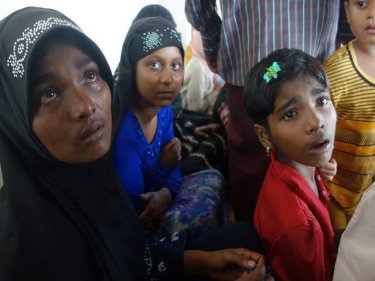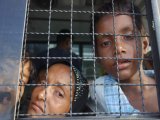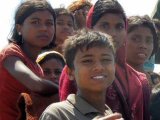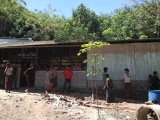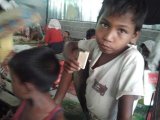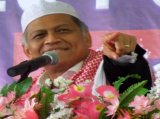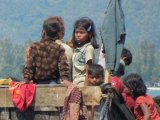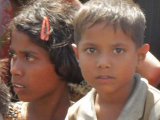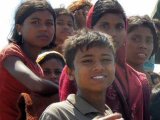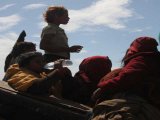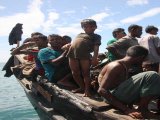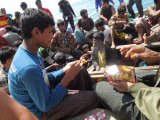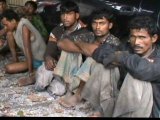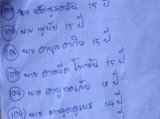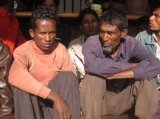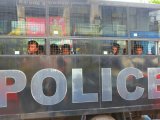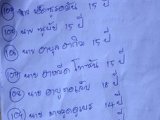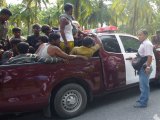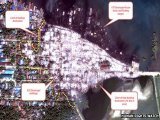UPDATE
THE THIRD Rohingya boat in three days - this one carrying 110 people and making a total of 313 men, women and children - arrived in Kuraburi, a fishing town north of Phuket, on Friday.
Original Report
PHUKET: Access to victims of human trafficking in Thailand has been granted in principle but no date has been set to begin the process, a spokesperson for the UN's refugee agency said today.
The comment from spokesperson Vivian Tan came as authorites north of Phuket dealt with another boatload of Rohingya - taking the total to 203 arrivals at one fishing port in two days.
Officials all over southern Thailand will struggle to house and feed hundreds of Rohingya in crowded refuge centres and cells while awaiting a date from Thailand's Foreign Ministry for the UN agency's assessment.
''Meetings are continuing but there is no clear idea as to when access will be granted,'' Ms Tan said. ''It should be soon.''
A range of issues needed to be resolved with the Foreign Ministry. ''We cannot go directly to local authorities,'' she said.
Ms Tan said that at this point, access to the men, women and children who had been held in traffickers' camps was under discussion.
There had been no talks yet about the boatpeople who continue to arrive in Thailand in large numbers.
Ms Tan said that the United Nations High Commissioner for Refugees would access the transit camp captives with the help of other agencies once a date was set.
''The scope and nature of the assessment has yet to be confirmed,'' she said today.
Aid groups are concerned about the terms of refence of the access. In the past, ''access'' has sometimes simply meant a head count and a wave through the cell bars.
Signs are promising so far, however, that Prime Minister Yingluck Shinawatra is genuinely concerned to halt or at least reduce the human trafficking that has been going on in Thailand for years under the noses of authorities.
Recognition of the scale of the trafficking probably means ending the ''help on'' policy under which Thailand gives boatpeople food, water and whatever they need to reach a ''third country'' - provided they do not land in Thailand.
The policy has played into the hands of people smugglers, abetted by unscrupulous military and local powerbrokers, who all make money from the human suffering.
As stateless people, unwanted and deprived of rights in their homeland, Burma, the Rohingya have been easy prey for what amounts to a slave trade along Thailand's west coast and across the Thai-Malaysia border.
On January 1, Phuketwan revealed the presence of women and children in a Rohingya boat that ran out of fuel at Phuket - the first time a boat had been spotted with families on board by a non-military source.
Since then, raids on a succession of illegal transit camps have revealed that almost 1000 men, women and children were being held captive by people smugglers in Thailand.
Many more camps have gone unraided so far, Phuketwan is led to believe from conversations this week with people brokers.
Another key issue is whether serious reforms are being proposed for Thailand's approach to the Rohingya issue, or whether only the people-trafficking is being addressed.
The realisation appears to be dawning among decision-makers in Bangkok that Burma's appalling treatment of the Rohingya can only be resolved by the government of Burma.
Another aspect to be considered is where the line is drawn between boatpeople and trafficking victims. Those who board the boats in Bangladesh or Burma have paid the people smugglers once.
Those who arrive in Thailand are usually obliged to pay human traffickers again before they can cross the Thai-Malaysia border.
According to locals in Phang Nga province, the first boatload of Rohingya to arrive in Kuraburi, north of Phuket, this week may have actually consisted of people who had been held in captivity in a camp on a nearby island for several days.
If that's correct, are these Rohingya classified in the eyes of the Foreign Ministry and the UNHCR as just-arrived boatpeople, or trafficking victims? Only time will tell.

